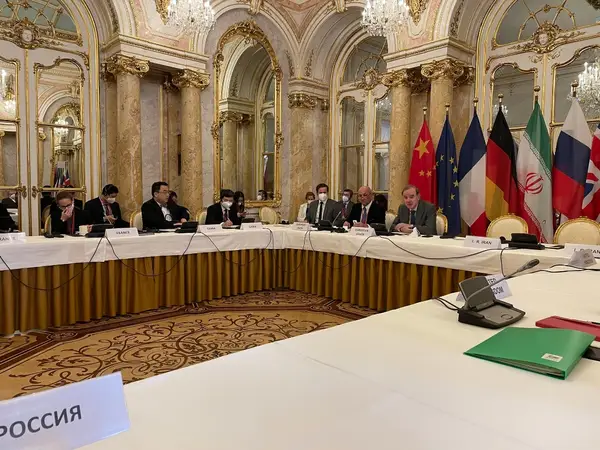In the wake of unsuccessful nuclear negotiations in Vienna, some state media in Iran on Saturday tried to put a more positive spin saying talks will continue.
Western media including British newspaper Guardianhave covered the end of the seventh round of nuclear negotiations saying that the talks "were suspended on Friday, with Europe warning that Iran had walked back on all previous diplomatic progress and fast-forwarded its nuclear programme." But some Iranian media including the IRGC-linked newspaper Javan have described the event as "European and US partners of the JCPOA taking Iran's proposals home with them for consultations in their capitals."
At the same time, other media such as proreform website Fararu have opined that "The nuclear talks are not about Iran's nuclear program. They are about a new, emerging world order as the United States' power is declining." Fararu furthermore quoted British journalist Peter Oborne as saying that the nuclear talks mark the beginning of a new Cold War in which instead of the United States and the Soviet Union, now China and the US are facing each other. Fararu quoted him as saying that this new Cold War started as the US hurriedly withdrew from Afghanistan and turned its focus to Asia.
The administration-owned daily newspaper Iran ran an optimistic front-page headline: "Laying the foundations for lifting the sanctions."
But Kar-o-Kargar daily, close to former Rouhani spokesman Ali Rabiei, ran an utterly pessimistic front-page headline: "The shadow of despair on the negotiating table." While Iran believes that the talks are going to be resumed next week, Kar-o-Kargar said that the talks have come to end for good.
Economic daily Asia took a position in between the two and quoted reformist lawmaker Massouid Pezeshkian as saying that negotiations would be meaningless without "give and take" and suggested that if Iran is looking for a solution to its economic problems, its nuclear negotiators should return to the talks next week.
Foreign policy analyst Ali Bigdeli told Setareh Sobh daily that Iran should withdraw its excessive demands and stick to a minimal request for lifting some of the sanctions.
Another economic daily, Jahan-e Sanat discussed the negotiations with several Iranian experts in a series of debates that were primarily focused on the role of China in the nuclear talks. Observers generally said that China appeared to be silent during this round of the negotiations. Experts told Jahan-e Sanat that the suspension of the talks is in China's interest and that China favors a situation where Iran and the West do not reach an agreement.
Jalal Sadatian, a former Iranian diplomat, told the daily that China is worried about any improvement in Iran's ties with the West. He added that both China and Russia benefit from the sanctions on Iran. Particularly China benefits from being the sole customer for Iran's oil.
Another former diplomat, Fereidoun Majlesi, agreed with Sadatian and said that "thanks to the sanctions, China has now monopolized trade with Iran and is using the situation to sell everything at a higher price while buying Iran's oil at unbelievable discounts."
Asked why Iran counts on China and Russia as its supporters in the nuclear negotiations, Majlesi said: "Iran feels committed to enmity with the United States and this brings it close to China from an ideological standpoint." He further said that Iran is isolated in the international community but likes to say that there are countries such as China that are Iran's allies.
Mohammad Marandi, a member of the Iranian negotiating team as well as some Iranian officials in Tehran said on Friday that that Iran will turn to China if the United States refuses to return to the JCPOA.
Ironically, Iranian journalist and historian Hossein Dehbashi revealed on Twitter on Saturday that Marandi is a US citizen and questioned his support for Iran in the negotiations. Marandi in his response posted a picture on Twitter and claimed the photo shows him in Basij militia uniform when he was 16.
